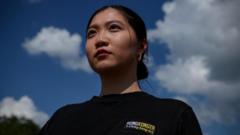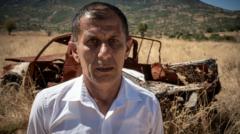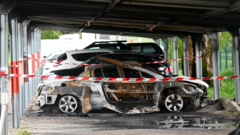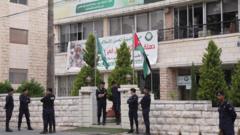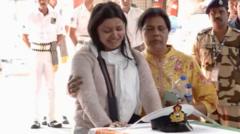In Istanbul, over 380 individuals were detained as authorities heavily restricted access to Taksim Square during May Day celebrations, prompting clashes between police and demonstrators amid heightened political tensions following the arrest of opposition mayor Ekrem Imamoglu.
Tensions Escalate in Istanbul Amid May Day Crackdown

Tensions Escalate in Istanbul Amid May Day Crackdown
Hundreds arrested as Turkey's authorities enforce strict measures against May Day protests.
In an aggressive show of force, Turkish authorities have detained hundreds of people in Istanbul amidst a major crackdown on May Day protests, deploying a staggering 50,000 police officers across the city. Public transport was halted to prevent access to Taksim Square, which has seen a ban on protests since 2013. Videos from the scene showed protests erupting into clashes with riot police as demonstrators were forcefully ushered onto waiting buses.
Taksim Square, usually vibrant with activity, was eerily quiet, lined with police and barriers that restricted movement in and out. A few labour unions were briefly allowed to enter with banners and flowers, but restrictions remained tight. A protestor, Murat, voiced frustrations at the measures being akin to a state of emergency, with streets staged as impassable unless permitted by authorities.
The civil unrest stems in part from the recent arrest of Istanbul's opposition mayor, Ekrem Imamoglu, which has sparked significant public outcry in previous weeks. On May 1, a day dedicated to workers’ demonstrations around the world, the Turkish authorities made it clear they were not willing to take any chances, resulting in a preemptive crackdown that had seen over 100 individuals detained prior to the main event.
According to local reports, a total of 382 arrests were made for alleged "non-authorized demonstrations." Amnesty International has strongly criticized the government's ban on protests in Taksim, deeming the justification for such actions "spurious." They urged the Turkish government to uphold the rights to peaceful demonstrations.
Imamoglu, regarded as a potential challenger to President Recep Tayyip Erdogan in the 2028 elections, has remained imprisoned on allegations of corruption, claims he staunchly denies, asserting that his arrest is politically motivated. Erdogan, who has been in power for over two decades, may be limited in future presidential ambitions unless a constitutional change occurs. As tensions surge in the city, the struggles for democracy and civil rights continue to play out against a backdrop of government restraint.
Taksim Square, usually vibrant with activity, was eerily quiet, lined with police and barriers that restricted movement in and out. A few labour unions were briefly allowed to enter with banners and flowers, but restrictions remained tight. A protestor, Murat, voiced frustrations at the measures being akin to a state of emergency, with streets staged as impassable unless permitted by authorities.
The civil unrest stems in part from the recent arrest of Istanbul's opposition mayor, Ekrem Imamoglu, which has sparked significant public outcry in previous weeks. On May 1, a day dedicated to workers’ demonstrations around the world, the Turkish authorities made it clear they were not willing to take any chances, resulting in a preemptive crackdown that had seen over 100 individuals detained prior to the main event.
According to local reports, a total of 382 arrests were made for alleged "non-authorized demonstrations." Amnesty International has strongly criticized the government's ban on protests in Taksim, deeming the justification for such actions "spurious." They urged the Turkish government to uphold the rights to peaceful demonstrations.
Imamoglu, regarded as a potential challenger to President Recep Tayyip Erdogan in the 2028 elections, has remained imprisoned on allegations of corruption, claims he staunchly denies, asserting that his arrest is politically motivated. Erdogan, who has been in power for over two decades, may be limited in future presidential ambitions unless a constitutional change occurs. As tensions surge in the city, the struggles for democracy and civil rights continue to play out against a backdrop of government restraint.

